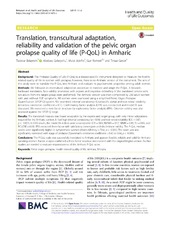| dc.contributor.author | Belayneh, Tadesse | en_US |
| dc.contributor.author | Gebeyehu, Abebaw | en_US |
| dc.contributor.author | Adefris, Mulat | en_US |
| dc.contributor.author | Rørtveit, Guri | en_US |
| dc.contributor.author | Genet, Tinsae | en_US |
| dc.date.accessioned | 2020-08-03T12:53:16Z | |
| dc.date.available | 2020-08-03T12:53:16Z | |
| dc.date.issued | 2019 | |
| dc.Published | Belayneh T, Gebeyehu A, Adefris M, Rørtveit G, Genet T. Translation, transcultural adaptation, reliability and validation of the pelvic organ prolapse quality of life (P-QoL) in Amharic. Health and Quality of Life Outcomes. 2019;17(1):12 | eng |
| dc.identifier.issn | 1477-7525 | |
| dc.identifier.uri | https://hdl.handle.net/1956/23369 | |
| dc.description.abstract | Background: The Prolapse Quality of Life (P-QoL) is a disease-specific instrument designed to measure the health-related quality of life in women with prolapse; however, there is no Amharic version of the instrument. The aim of this study were to translate the P-QoL into Amharic and evaluate its psychometric properties among adult women. Methods: We followed an intercultural adaptation procedure to translate and adapt the P-QoL. A forward–backward translation, face validity interviews with experts and cognitive debriefing of the translated version with ten adults from the target group were performed. The Amharic version was then completed by 230 adult women with and without POP symptoms. All women were examined using a simplified Pelvic Organ Prolapse Quantification (SPOP-Q) system. We examined internal consistency (Cronbach’s alpha) and test–retest reliability (intraclass correlation coefficient = ICC). Confirmatory factor analysis (CFA) was conducted and model fit was discussed. We extracted a new factor structure by exploratory factor analysis (EFA). Criterion validity was also assessed against the SPOP-Q stage. Results: The translated measure was found acceptable by the experts and target group, with only minor adaptations required for the Amharic context. It had high internal consistency (α = 0.96) and test–retest reliability (ICC = 0.87; p < 0.001). In CFA results, the model fit indices were unacceptable (CFI = 0.69, RMSEA = 0.17, SRMR = 0.43, TLI = 0.65, and PCLOSE = 0.00). EFA extracted three-factor with satisfactory convergent and discriminant validity. The P-QoL median scores were significantly higher in symptomatic women (Mann-Whitney U Test; p < 0.001). The score was also significantly correlated with stage of prolapse (Spearman’s correlation coefficient = 0.42 to 0.64, p < 0.001). Conclusions: The P-QoL scale was successfully translated to Amharic and appears feasible, reliable and valid for Amharic-speaking women. Factor analysis confirmed a three-factor structure, inconsistent with the original English version. Further studies are needed to evaluate responsiveness of the Amharic P-QoL score. | en_US |
| dc.language.iso | eng | eng |
| dc.publisher | BioMed Central | eng |
| dc.rights | Attribution CC BY | eng |
| dc.rights.uri | http://creativecommons.org/licenses/by/4.0 | eng |
| dc.title | Translation, transcultural adaptation, reliability and validation of the pelvic organ prolapse quality of life (P-QoL) in Amharic | en_US |
| dc.type | Peer reviewed | |
| dc.type | Journal article | |
| dc.date.updated | 2020-01-11T14:30:53Z | |
| dc.description.version | publishedVersion | en_US |
| dc.rights.holder | Copyright 2019 The Author(s) | |
| dc.identifier.doi | https://doi.org/10.1186/s12955-019-1079-z | |
| dc.identifier.cristin | 1753764 | |
| dc.source.journal | Health and Quality of Life Outcomes | |

